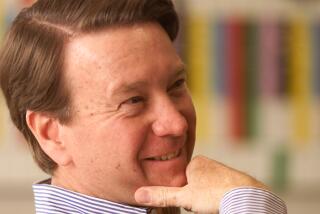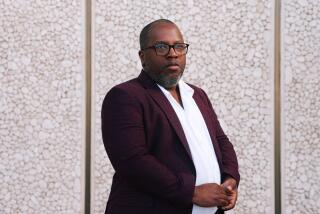British TV Exec to Test His Edge at USA
- Share via
LONDON — The latest Michael Jackson to hit the U.S. entertainment industry is neither a singer nor a radio personality. He is an impatient fortysomething executive giving up one of the best jobs in British television to take over as president and chief executive of USA Entertainment Group.
Jackson, 43, has made his mark in Britain by aggressively pushing strong, and sometimes controversial, shows in his drive to turn commercial Channel 4 from a marginal player into a popular and profitable source of entertainment. He brought unscripted television to Britons with “Big Brother,” along with U.S. series such as “Ally McBeal” and “The Sopranos.”
He also saw Britain’s first gay drama, “Queer as Folk,” onto the air. The show received more viewer complaints than any other program on British television and was censured by regulators for its “celebratory” portrayal of underage gay sex. The show has been adapted in the U.S. by Showtime.
Over the weekend, Jackson was caught up in another controversy regarding his decision to air a spoof documentary on child abuse that was denounced by the home secretary, the culture secretary, the National Society for the Prevention of Cruelty to Children and the tabloid press for “trivializing” an important issue.
Jackson countered that “Brass Eye,” which featured actors posing as child molesters and mock interviews with pedophiles, had a sense of “social purpose” and “sought to challenge the inconsistencies in the way the media approaches and sensationalizes pedophile crime.”
Under his stewardship, the channel swept Britain’s equivalent of the Emmy Awards this year, taking 11 of the 19 Bafta awards.
“Watching Jackson’s Channel 4 was sometimes like reading the New Yorker and finding a couple of pages of the National Enquirer stitched in,” said the Guardian newspaper’s media analyst, Mark Lawson.
It is unclear what that bodes for USA Entertainment, which announced that Jackson will be responsible for USA Cable, Studios USA and USA Films--producers of such critical and financial hits as “Traffic” and “Being John Malkovich”--and report directly to USA Networks Inc. Chief Executive Barry Diller.
It also is not clear whether Jackson’s edgy originality and success in capturing the 18-to-30-year-old market in Britain will play across the Atlantic, where other high-powered British media executives have not always fared well. To Britons, Jackson has an American sense of television and popular culture. He “comes from a media generation which has American culture as its instinctive second language,” Lawson wrote.
It remains to be seen whether Americans will agree. Some critics suggested that buying U.S. shows for Britons is a far cry from making programs in the United States for Americans. Jackson thinks he can make his experience work in the United States.
“These jobs are all about a mixture of creativity and entrepreneurship and about good judgment,” Jackson said in a telephone interview. “Those things hopefully travel with you.”
“Obviously, it’s a different culture. As much as you study and visit another place, if you don’t grow up there, obviously you’re an outsider. But that can be valuable, too,” he said. He added that some of the best films about Americans are made by non-Americans, naming Alfred Hitchcock’s “North by Northwest.”
Jackson is a Cheshire baker’s son who began his television career in independent production companies. He joined the BBC in 1988 as founding editor of an arts review program, “The Late Show,” where he made a name for himself as an intellectual. He was named controller of BBC2 in 1993 and three years later took over as director of television and controller of the flagship BBC1.
He moved over to Channel 4 in July 1997, where he launched the digital channels Film Four and E4--neither of which has broken even--and has scheduled an interactive horse-racing channel, Go Racing, for next year.
A Film Four hit, “East Is East,” about a mixed Pakistani-English family that runs a fish-and-chip shop in northeast England, is regarded as the kind of multicultural film he might want to encourage in U.S. film and television. Jackson called it “the best that TV does” but chose to emphasize “Big Brother” as the interactive television of the future.
Diller said he had been trying to get Jackson to USA for quite a while and that finally luring him across the ocean was “just great.”
Jackson hedged when asked about his plans for USA Entertainment, saying only that he will “look at the total package of channels and programming and how they work with each other and in the group.” He said he’s excited by the challenge of working in “a bigger country, a bigger entity, a bigger train set.”
About to embark on his fifth senior television job in less than a decade, however, Jackson has developed a reputation for restlessness. Rumors already are flying in London that he will use the position in New York and Los Angeles as the final training ground for the job of director general of the BBC in a few years.
“I have no plans to come back,” Jackson said. “I am not planning my departure before I arrive.”
More to Read
The complete guide to home viewing
Get Screen Gab for everything about the TV shows and streaming movies everyone’s talking about.
You may occasionally receive promotional content from the Los Angeles Times.






